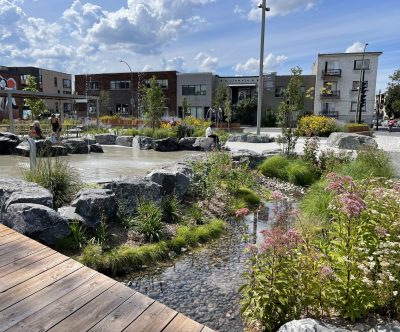Ali Romdhani, postdoctoral researcher at UQAM’s Research Chair on the Ecological Transition, and René Audet, professor at UQAM’s Department of Strategy, Social and Environmental Responsibility
Introduction
Alongside the adjectives “ecological,” “energetic,” “fair” and “low-carbon,” the notion of transition has become a central focus of environmental discourse. Transition refers to a set of social, economic and technological changes towards an ecologically sustainable society. In Europe and North America, the concept of transition has replaced that of sustainable development, which has become overused. Yet the concept of transition has its own history and is not used in the same way in all contexts. Distinguishing its uses therefore becomes an essential research challenge. Carried out in partnership with the Campus de la transition écologique, our study proposes a typology of these discourses on the scale of the Montreal metropolitan region. This seems to require observing how transition is territorialized at local and regional levels with its actors, visions and strategies. We first present the state of the literature on the discourse of transition, then the methodology of the study, followed by the typology developed to report the results. We conclude with a discussion of the contributions of these discourses to the ecological transition in the Montreal metropolis.
The ecological transition discourse
Jacques Theys (2017) proposes two conceptions of transition that lend themselves as a starting point for reflection. The first one sees transition “as a passage, an in-between, a period of instability and trial and error between two phases of stability” (2017, p. 87; own translation), or as a process of social change. This comprises the most common understanding of the term in both everyday language and in the sciences. It is also the one which is most commonly used in public policy, notably on the energy transition, which also implies a process of technological substitution. The second conception sees transition as “a path or a setting into motion towards a desired change—with a horizon that is defined a priori” (2017, p. 87; own translation). This perspective harkens back to the origins of the transition movement, where cities and citizen initiatives sought to create and realize positive visions of change. Overall, these efforts subscribed to what has been termed the “positive ecology movement,” which looks to inspire people to take action in a type of utopian spirit that is aptly captured in the film Tomorrow (2015). Thus, transition designates a process of change and a goal at once regarding the ecologically sustainable society we need to build. On the one hand, it is an organizational issue (how do we accomplish the transition?) and, on the other, a normative issue (what kind of society do we want to achieve?). Transition as a process has its origins in ecological modernization (Mol and Sonnenfeld, 2000) and, more broadly, sustainable development (Adams, 2009). This approach is widely used by governments and international institutions, which maintain a technicist conception of social change. Conversely, social movements for transition, such as the “transition town” network or organizations like Solon, attempt to re-politicize the question of a society’s ends by insisting on the limits to progress, growth and development (Silva and Stocker, 2018). Transition then implies a political project of rebuilding society within the bounds of the limits of our planet Earth (Raworth, 2017; Rockström et al., 2009). We study transition as a discourse; in other words, “a set of ideas, concepts, and categorizations that are produced, reproduced and transformed in a particular set of practices and through which meaning is given to physical and social realities” (Hajer, 1995, p. 44; own translation). The discourse of transition has been the subject of numerous classifications (e.g., Dryzek, 2013; Stevenson, 2019), of which we retain here the distinction between two approaches: either “technocentric” (transition is a technical problem) or “sociocentric”[1] (transition is a social problem) (Audet, 2016; Bailey and Wilson, 2009). Indeed, the dominant discourse generally promoted by state and international institutions describes transition as a technological issue, namely that of fossil fuel substitution. The transition is then motivated by the economic opportunities offered by the opening up of new markets, where the state guides investment. Conversely, the sociocentric discourse is often localist, focusing on cultural change, resilience and lifestyles. Our aim is to shed light on the discourse of transition at a meso scale, that of the Montreal metropolitan region. This position is little discussed in the literature, which is essentially limited to the macro (national and international levels) and micro discourses (local transition initiatives). A comparison of four documents on transition shows that this topic is much more complex than what is conveyed by the classic distinction between technocentric and sociocentric.
Partnership research approach
Our partnership with the Campus de la transition écologique was organized in two stages. First, we carried out an analysis of transition discourses in Quebec. For this, we selected four recent documents that are representative of heterogeneous positions and deal explicitly with transition. These are:
- The Quebec government’s 2030 Plan for a Green Economy (2020), hereafter referred to as the “Green Plan”;
- Ville de Montréal’s Climate Plan 2020‒2030 (2020), hereafter referred to as the “Climate Plan”;
- The Québec ZéN (zéro émission nette) project, a roadmap for Quebec’s transition to carbon neutrality of the Front commun pour la transition énergétique (2020), hereafter “Québec ZéN”;
- The Récit collectif de la transition sociale et écologique (Collective narrative of the social and ecological transition), the result of a joint project led by Solon, TIESS, Chaire de recherche sur la transition écologique (Research chair on the ecological transition, UQAM) as well as numerous citizens (2022), hereafter the “Collective Narrative.”
Secondly, we organized three workshops with 26 transition actors in the Montreal metropolitan area, in order to examine how these discourses apply in practice. The participants were chosen on the basis of their activities closely related to transition issues. We selected a sample of organizations working in a variety of sectors and on a variety of themes (Table 1). Our sample is representative of the transition community, with a preponderance of members of civil society, metropolitan institutions and people working in the environmental field. However, we did not invite any companies, as they are still relatively uninvolved in the transition discourse.
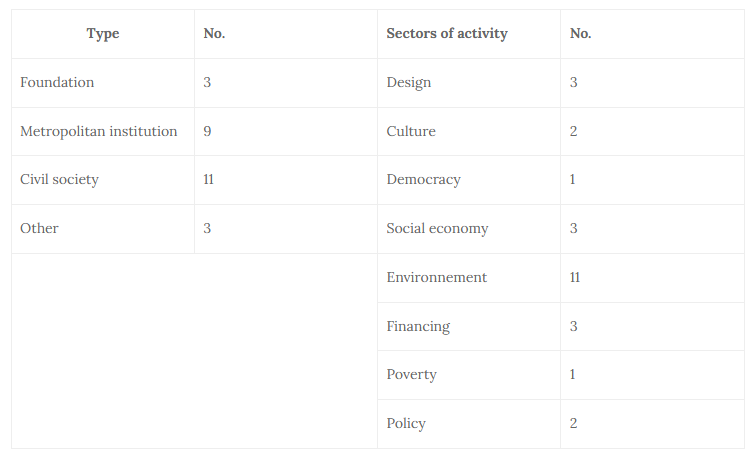
Source: Ali Romdhani and René Audet, 2022
These workshops focused on visions of transition on a metropolitan scale and strategies for achieving those visions. We asked participants to select statements from the discourses and arrange them in ways that best reflected their own view of transition.
Transition in the Montreal metropolitan region
Our analysis led to the creation of a schema we call the “transition compass,” which consists of three axes whose polarities represent principles in tension (Figure 1). These axes relate to process, purpose and socio-territorial scale, a theme pertaining to our unit of analysis (the metropolitan region). These polarities are not mutually exclusive: one discourse may position itself on two axes at once and attempt to reconcile the tensions. The axes are as follows:
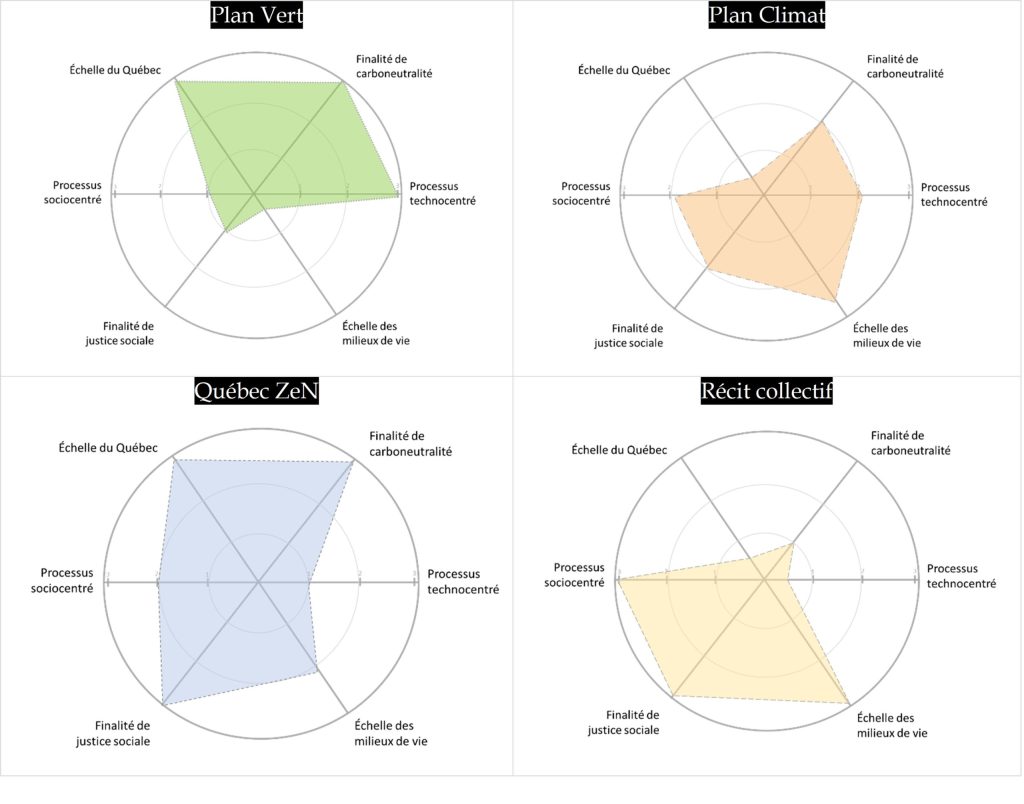
Source: Ali Romdhani and René Audet, 2022
- The transition process (sociocentric/technocentric) describes the way in which changes are envisaged. A sociocentric transition means an approach focused on social processes, such as social innovations, strengthening social ties, increasing resilience or transforming social organization in general. In contrast, a technocentric transition focuses on expertise, the mastery of (new) technologies and the development of a green market economy.
- The purpose of the transition (carbon neutrality/social justice) describes the objective of the transition, its aim. Carbon neutrality as a goal leads to a transition focused on reducing and offsetting GHG emissions. A transition guided by a goal of social justice focuses on social needs for equality, recognition and fulfillment.
- The socio-territorial scale (Quebec/living environments) helps contextualize the scope of the discourse. The most local scale is that of living environments, in other words, an individual or a community’s neighbourhood or territory of reference. The province of Quebec is the broadest level in the documents analyzed.
We summarize the four documents above as follows: The Green Plan is a planning document for the next ten years. It aspires to a transition to a green economy, and is fundamentally technocentric and Quebec-wide in scope. Its vision is to achieve carbon neutrality by 2050, by turning climate change into a business and development opportunity. It is a framework document for the “climate transition,” with GHG reduction at its core. This will be made possible by the electrification of transport and the development of strategic sectors such as batteries and electric trucks. The Climate Plan, for its part, is a planning document that aims to reduce the carbon footprint and improve the quality of life of Montrealers. In this way, it is a discourse that targets scales ranging from the living environment to the metropolis, and is inscribed in a relatively technocentric process. While most of the measures proposed concern GHG reduction, some are also geared towards improving living conditions and social justice. Residents are seen as the bearers of civic innovations and climate actions to be deployed with a view to creating “social capital” and increasing the autonomy of local communities by multiplying opportunities for networking and sharing. Québec ZéN is the fruit of a social movement for a just transition. It is representative of a sociocentric process on the scale of Quebec, but one which, as its form indicates in Figure 1, spills over on several axes. Indeed, this discourse is primarily aimed at carbon neutrality, and the means to achieve it require large-scale energy substitution. However, it rejects “techno-solutionism,” or in other words, the propensity to prioritize technological solutions to combat climate change. In this sense, it is also highly sociocentric, insofar as transition is a means of achieving greater social justice. While aspiring to a transition within Quebec society, the discourse is also anchored in living environments, as it proposes to achieve this goal through resilient communities. The Collective narrative of the social and ecological transition in English, finally, is not a planning document or action plan like its predecessors. Instead, it emerged from a process of projecting a desirable future that aims to inspire action. It is fundamentally rooted in the scale of living environments and in the perspectives of social justice, inclusion and fulfillment. The Narrative views both the fight against climate change and carbon neutrality as the effects of primarily social transformations. Above all, it sees the transition as an opportunity to realize humanist and universalist ideals.
In consideration of our analysis of these four polarities in tension, we asked the participants of our three workshops about their vision and preferred transition strategies. Their respective visions for the metropolitan territory can be summarized (citations our own translation) in four key points:
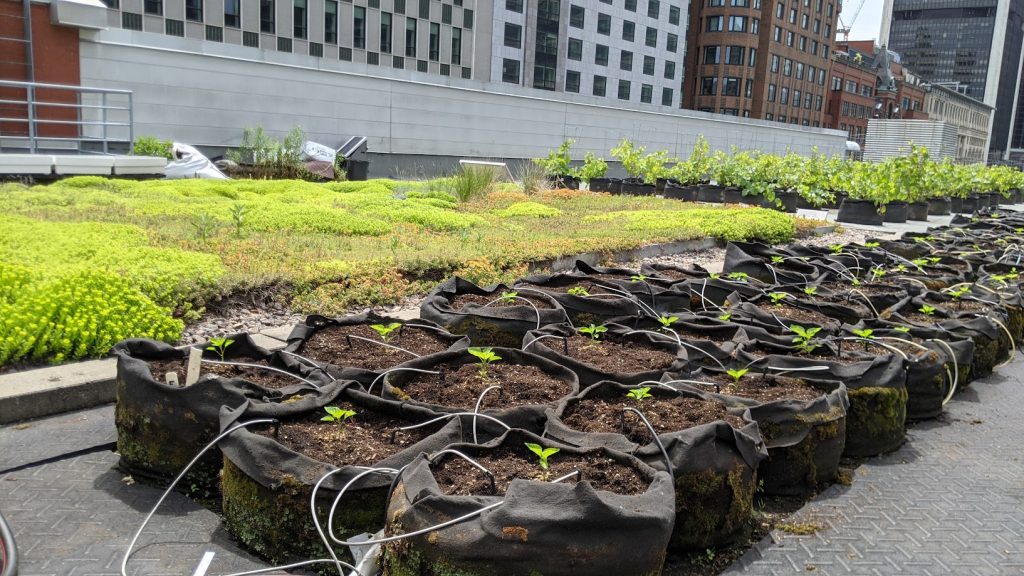
Credit: Chaire de recherche en action climatique urbaine
1) The most vulnerable will be the first to suffer the social consequences of the climate crisis, even if the transition implies sacrifices on everyone’s part. As a result, it is important that social justice and the fight against inequality be “the first concern to be borne in mind.”
2) The transition must be grounded in living environments rich in social ties, as “this is where the transition becomes concrete.” Organizing cities and neighbourhoods differently, rethinking housing construction or rethinking ways of getting around will all require a new, mobilizing social contract. Living environments make it possible to address numerous other dimensions of a social transformation and to become an overall driver of the transition, in other words, “something that will help drive the other changes.”
3) The role of democracy, with citizens at the heart of the process of change, is essential to “change the balance of power between those who benefit from the crisis and those who will suffer.” However, democratic processes are laborious, and we must avoid the trap of using them as an instrument of social acceptability. More broadly, we need to encourage citizens’ initiatives and participatory democracy and not simply formal representative processes.
4) The relationship with nature is important, but neglected and poorly understood. It would therefore be relevant to “step back from the exploitation of nature and ask the right questions about relations of domination.” This would make it possible to show that city dwellers are “disconnected from ecosystems” and used to positioning themselves outside nature.
Participants also prioritized three transition strategies that focus on the role of culture, innovation and the economy, respectively.
1) Through education and awareness-raising, it is possible to deconstruct dominant norms, promote different imaginaries and mobilize positive narratives to represent the transition. In short, it is about initiating cultural change. In this sense, some participants advocate the implementation of social marketing campaigns and the banning of advertising that encourages the consumption of products that are harmful to the environment.
2) Innovation and experimentation are essential to inspiring change, as they mobilize the imagination needed to rethink the economic system and standardize new lifestyles. Actors in the social and solidarity economy, innovators and entrepreneurs are in a position to create experiences of nature in the city, exert influence on one another and create communities of practice.
3) Changing the economic system requires democratic mechanisms. We need to be able to build the city through the commons, through co-construction processes, because “changing the economic system is scary —you have to go through democracy to make it acceptable” (own translation). The City of Montréal, social and solidarity economy players, civil society and social justice movements are able to change funding criteria, broaden participation and reform institutions.
Conclusion
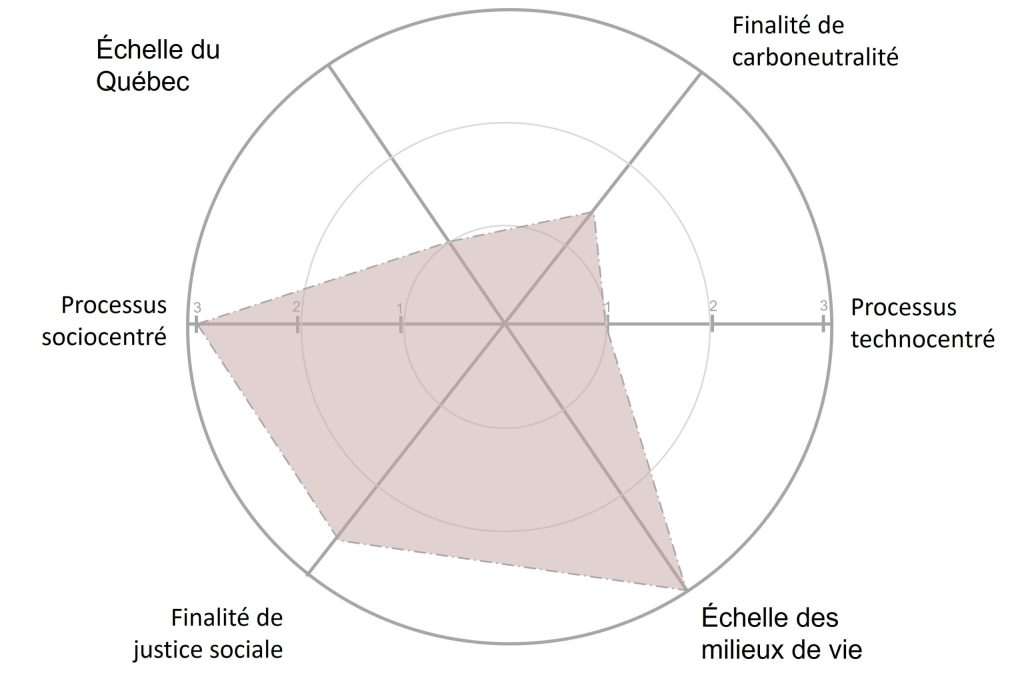
Source: Ali Romdhani et René Audet, 2022
The discourse concerning transition in Quebec shows a certain diversity, which our typology helps to capture. At the metropolitan level, visions and strategies are more oriented towards a sociocentric process and social justice (Figure 2). GHG reduction appears to be less important than other issues, such as the relationship with nature or the transformation of the economic system. Conversely, the technocentric process is essentially the preserve of the Quebec government and has less resonance at the metropolitan level. This seems logical: the substitution of fossil fuels must be planned on a large scale and requires major investments that local authorities cannot easily manage. However, it is interesting to note that “technological solutionism” is widely rejected by Québec ZéN, the Collective Narrative and our workshop participants. For example, all attached very little importance to the electrification of transport or the creation of new green markets. This leads us to conclude that transition on a metropolitan scale is conceived more as a process of social and cultural change (values, lifestyles, social organization) than technological change (transport electrification, green markets).
For more information on this matter, we recommend consulting (French only): Quatre discours de la transition écologique pour la région métropolitaine de Montréal and Vers une vision de la transition écologique pour le Grand Montréal.
To cite this article
Romdhani, A., Audet, R. (2022). The discourse of ecological transition in Greater Montreal. In Cities, Climate and Inequalities Collection. VRM – Villes Régions Monde. https://www.vrm.ca/le-discours-de-la-transition-ecologique-dans-le-grand-montreal-2
Reference Text
Romdhani, Ali, et Audet, René. (2022). « Portrait des discours de la transition écologique au Québec ». Contributions de la Chaire de recherche UQAM sur la transition écologique no 21. Romdhani, Ali, et René Audet. (2022). « Vers une vision métropolitaine de la transition écologique pour le Grand Montréal ». Contributions de la Chaire de recherche UQAM sur la transition écologique no 22.
References
Adams, W. M. (2009). Green Development. Environment and Sustainability in a Developing World. Routledge. Audet, R. (2016). « Discours autour de la transition écologique ». Dans M.-J. Fortin, Y. Fournis et F. L’Italien (dir.), La transition énergétique en chantier : les configurations institutionnelles et territoriales de l’énergie. Vie économique. Presses de l’Université Laval.
Audet, R., Butzbach, C., Manon, M., et al. (2021). « Vers un récit citoyen : transition sociale et écologique ». À bâbord! Bailey, I., et Wilson, G. A. (2009). « Theorising Transitional Pathways in Response to Climate Change: Technocentrism, Ecocentrism, and the Carbon Economy ». Environment and Planning A: Economy and Space, 41(10), p. 2324‑2341.
Dryzek, J. S. (2013). The Politics of the Earth: Environmental Discourses. (3e éd.). Oxford University Press. Front commun pour la transition énergétique. (2020). Projet Québec ZéN (zéro émission nette). Feuille de route pour la transition du Québec vers la carboneutralité. Gouvernement du Québec. (2020). Plan pour une économie verte 2030. Politique-cadre d’électrification et de lutte contre les changements climatiques.
Hajer, M. A. (1995). The Politics of Environmental Discourse: Ecological Modernization and the Policy Process. Clarendon Press Oxford. Mol, A. P., et Sonnenfeld, D. A. (2000). « Ecological Modernisation around the World: An Introduction ». Environmental Politics, 9(1), p. 1‑14.
Raworth, K. (2017). Doughnut Economics: Seven Ways to Think like a 21st Century Economist. Chelsea Green Publishing. Rockström, J., Steffen, W., Noone, K., et al. (2009). « Planetary Boundaries: Exploring the Safe Operating Space for Humanity ». Ecology and Society, 14(2).
Silva, A. et Stocker, L. (2018). « What Is a Transition? Exploring Visual and Textual Definitions among Sustainability Transition Networks ». Global Environmental Change, 50, p. 60‑74.
Stevenson, H. (2019). « Contemporary Discourses of Green Political Economy: A Q Method Analysis ». Journal of Environmental Policy & Planning, 21(5), p. 533‑548.
Theys, J. (2017). « Prospective et recherche pour les politiques publiques en phase de transition ». Natures Sciences Sociétés, (supp. 4), p. 84‑92. Ville de Montréal. (2020). Plan climat 2020-2030.
